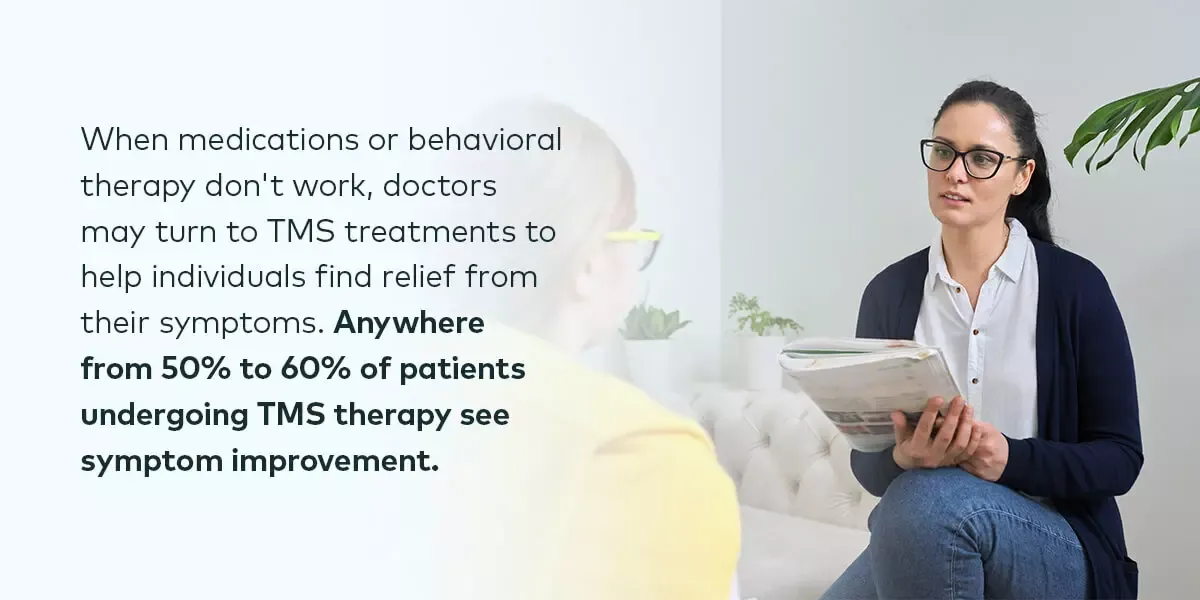Transcranial Magnetic Stimulation (TMS) is a noninvasive treatment that uses magnetic pulses to stimulate nerve cells in the brain. It’s often used to treat depression and other mental health conditions. TMS may also help people with neurological disorders like Parkinson’s disease or multiple sclerosis.
This article explains what TMS is, who it can help, and its benefits and risks.
How Does TMS Work?
TMS is a type of brain stimulation therapy. It uses repetitive magnetic pulses, which is why it’s sometimes called repetitive TMS (rTMS). The treatment is done in a medical clinic or hospital, and you don’t need to stay overnight.
Here’s what happens during a TMS session:
- You’ll sit in a comfortable chair and wear earplugs to block the clicking sound of the machine.
- A technician will measure your head to find the right spot to place the magnetic coil.
- The coil is placed above the front part of your brain, and magnetic pulses are delivered.
- You’ll feel a tapping or knocking sensation during the treatment, which lasts 30 to 60 minutes.
- After the session, you can go home and resume your normal activities.
TMS is usually done 5 days a week for 4 to 6 weeks, depending on your condition and response to treatment.
What Conditions Can TMS Treat?
TMS is FDA-approved to treat major depressive disorder (MDD), especially for people who don’t respond to antidepressants or therapy. It’s also being studied for other conditions, including:
1. Depression
- TMS targets the prefrontal cortex, a part of the brain linked to depression symptoms like low energy and mood.
- It’s effective for treatment-resistant depression, where medications and therapy haven’t worked.
2. Obsessive-Compulsive Disorder (OCD)
- TMS can reduce overactivity in brain areas linked to OCD symptoms.
- It’s FDA-approved for OCD when other treatments fail.
3. Anxiety
- TMS may help reduce anxiety by calming overactive nerve cells in the brain.
- It’s particularly helpful for generalized anxiety disorder (GAD).
4. Post-Traumatic Stress Disorder (PTSD)
- TMS targets the prefrontal cortex, which helps regulate fear and worry.
- Studies show it can be effective, especially when combined with therapy.
5. Stroke Recovery
- TMS may improve movement and swallowing difficulties after a stroke by stimulating the brain’s motor cortex.
6. Parkinson’s Disease
- TMS can help with symptoms like tremors, balance issues, and freezing of gait.
7. Schizophrenia
- TMS may reduce auditory hallucinations by targeting overactive brain areas.
8. Alzheimer’s Disease
- Early research suggests TMS could improve memory and cognitive function.
9. Chronic Pain
- TMS may help conditions like fibromyalgia by stimulating the brain’s pain control centers.
10. Nicotine Addiction
- TMS can reduce cravings by targeting the brain’s reward system.
11. Multiple Sclerosis (MS)
- TMS, combined with physical therapy, may reduce muscle tightness and improve movement.
Who is TMS For?
TMS is often recommended for people who:
- Haven’t responded to antidepressants or therapy.
- Experience severe side effects from medications.
- Are young (children and teens), as they may have fewer side effects with TMS.
Who Should Avoid TMS?
TMS is safe for most people, but it’s not recommended if you have:
- Metal implants in your head (e.g., stents, cochlear implants, or bullet fragments).
- A history of seizures or epilepsy.
- A condition that increases seizure risk.
What Are the Side Effects?
TMS is generally well-tolerated, but some people may experience:
- Mild headaches (most common).
- Scalp or neck pain.
- Tingling or facial twitching.
- Lightheadedness or sleepiness.
Serious side effects, like seizures, are very rare.
How Much Does TMS Cost?
TMS can cost 6,000to12,000 for a full course of treatment. Many insurance plans, including Medicare, may cover TMS if other treatments haven’t worked.
Key Takeaways
- TMS is a noninvasive treatment that uses magnetic pulses to stimulate brain activity.
- It’s FDA-approved for depression and OCD, with promising results for other conditions.
- TMS is safe and effective, especially for people who don’t respond to medications.
- Side effects are mild and rare, but TMS isn’t suitable for everyone.
If you’re struggling with depression or another condition, TMS could be a helpful option. Talk to your doctor to see if it’s right for you.

